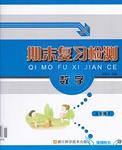题目内容
—I was caught in the heavy rain, so I couldn’t be back by 7 o’clock.
—__________! Janna was here to see you.
A. Good luck B. What a pity C. Never do it again D. Well done
B

练习册系列答案
 小学期末冲刺100分系列答案
小学期末冲刺100分系列答案 期末复习检测系列答案
期末复习检测系列答案 超能学典单元期中期末专题冲刺100分系列答案
超能学典单元期中期末专题冲刺100分系列答案 黄冈360度定制密卷系列答案
黄冈360度定制密卷系列答案
相关题目